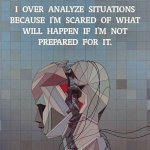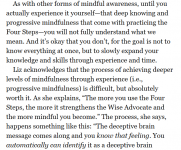He is also on Youtube, e.g.:
An Introductory Overview of the Four Steps Treatment Method for OCD - YouTube
more videos:
Video - JEFFREY M. SCHWARTZ, M.D.
From the related thread at Psychlinks that David just mentioned:
There was a self-help book by someone else titled "The Situation is Hopeless But Not Serious." The book was not on OCD, but I find it helps to think of repetitive thoughts that way -- they seem so dark and harrowing at times, and yet do not need to be taken seriously at all.
An Introductory Overview of the Four Steps Treatment Method for OCD - YouTube
more videos:
Video - JEFFREY M. SCHWARTZ, M.D.
From the related thread at Psychlinks that David just mentioned:
The Four Steps - Dr Jeffrey Schwartz - Brain Lock
Four Steps Summary
Step 1: Relabel. Recognise that the intrusive obsessive thoughts and urges are the RESULT OF OCD.
Step 2: Reattribute. Realise that the intensity and intrusiveness of the thought or urge is CAUSED BY OCD; it is probably related to a biochemical imbalance in the brain.
Step 3: Refocus. Work around the OCD thoughts by focusing your attention on something else, at least for a few minutes: DO ANOTHER BEHAVIOUR.
Step 4: Revalue. Do not take the OCD thought at face value. It Is not significant in itself.
There was a self-help book by someone else titled "The Situation is Hopeless But Not Serious." The book was not on OCD, but I find it helps to think of repetitive thoughts that way -- they seem so dark and harrowing at times, and yet do not need to be taken seriously at all.



